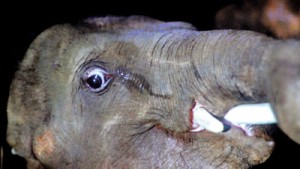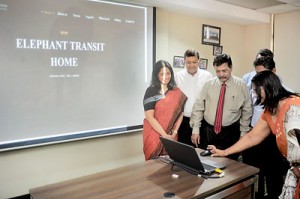News
A haven for the ‘Abhimans’ of our wilds

Beloved baby: Abhiman. Pix by Amila Gamage
Just two years old, Abhiman is their beloved baby – not to keep forever, though they have ‘adopted’ him. His ‘foster parents’ are privileged to love and cherish him from afar, seeing his antics, maybe for another three years until he gains his rightful freedom.
For Abhiman, his rightful freedom will include roaming the jungles at will, foraging for what he fancies, engaging in ‘power’ struggles with his peers to establish who is stronger, strolling into wewas for a dip at even-tide, falling in love with a beauty, having babies and after a long life, dying a peaceful death.
Unfortunately, Abhiman was born free but people’s inhumanity and cruelty put paid to his freedom.
Fortunately for him though, Sri Lanka has the unique ‘Elephant Transit Home’ (ETH) in Uda Walawe run by the Department of Wildlife Conservation (DWC), the first in the whole of Asia and the second such rehabilitation programme in the world, after Africa.
Into the ETH are brought motherless baby elephants in agony, like little Abhiman, the physical and mental trauma visible in their beautiful eyes, some so tiny that there is still fuzz on their heads. Here they are fed milk, with minimum human contact, though it breaks the hearts of the DWC officials and other staff not to pet them, weaned, introduced to their usual food and released back into the jungle and freedom.
Some little ones have faced much trauma because their mothers have got killed right before their eyes, leaving them crying and whimpering, reluctant to leave their dead mothers’ side. Other baby elephants have fallen into cultivation wells or pits accidentally or have got their jaws blown off by hakka-patas or been entangled in traps and nooses, all set willfully by humans.

Dr. Vijitha Perera
Not only has Abhiman become the protégé of Hemas Holdings, with his adoption by its Green Club set up under the Group Sustainability Division, but March 16 also saw the launch of the official website of the ETH at a simple but moving ceremony held at Hemas House. (See box below)
Earlier, we are greeted by images of elephants in all their majesty, babies, duos, threesomes and herds, with Heritage TV’s Hema Nalin talking about how the ETH is not just a project but a passionate conservation mission.
In the gathering at this function were DWC’s Director-General W.S.K Pathirathna and ETH’s Assistant Director and Veterinary Surgeon Dr. Vijitha Perera and Hemas Holdings Group Director Imtiaz Esufally.
It is the Head of Group Sustainability and Corporate Communications of Hemas Holdings, Shiromi Masakorala who explains how they as a big company with more than 5,000 employees have a comprehensive environment policy to which they adhere strictly. “This is to make sure that the company has minimum impact on the environment. Even this won’t do and we go a step further to protect Mother Nature through sustainable programmes.”
This led to the setting up of the Green Club with a core group of about 100 who put forward concrete suggestions which could be followed up by actions.

DG W.S.K Pathirathna
Citing the case of how the auto-filters of Hemas House were flushing out in the nights a total of eight million litres of water per year, Ms. Masakorala said that when one member brought it to the attention of the management, they reacted positively and installed a new system in which the flushing could be done manually. Wherever their business takes them, the employees also ensure that best practices are followed with simple actions such as switching off lights once a meeting is over. They have also been heavily involved in tree planting campaigns by distributing kos, madang and mahogany.
The Green Club has also successfully launched projects to recycle e-waste, while engaging in other initiatives to promote a love of nature by organizing treks into the wilderness for its members.
Referring to the adoption or sponsorship of Abhiman, she points out that his name is derived from ‘Abimana’ (which means take pride in what you do), the Hemas core value programme for its staff. It would have been easy for the management to write out a cheque for the ETH and then forget about it thereafter. “However, everyone in the company chipped in to sponsor Abhiman, generating a sense of belonging and a sense of ownership over the baby elephant who will be at the ETH for three more years,” she added.

Shiromi Masakorala
Opened in 1995, nearly 125 elephants have been released into the wild, from the ETH. These orphaned babies had found a temporary home there, after being brought from different parts of the country, to be nourished, comforted and looked after, with minimum human contact to facilitate the easy re-integration into the wilds.
This is to ensure that once released, these elephants will join a herd.
| Workings of ETH since inception, on website |
| The official website of the Elephant Transit Home (ETH) in Uda Walawe hosted through the Department of Wildlife and Conservation (DWC) and developed and sponsored by the members of Hemas Green Club, was launched amidst a distinguished gathering on March 16.
It gives an insight into the workings of the ETH since its inception, highlights a few of the numerous success stories of rehabilitation of wild baby elephants, what happens behind the scenes to maintain and look after them and their subsequent release into the jungles. With the fervent belief that the ETH rehabilitation programme and conservation efforts in Sri Lanka will be given a boost with the launch of this website, the Hemas Green Club is hopeful that once people browse it, they will click on the ‘Donation Page’ and find out how they can support this cause. There are many ways in which they can do so – through sponsorship of orphaned elephants, donations in cash, equipment for the ETH or volunteer services as listed in the ‘Wish List’. |


 This website: www.eth.dwc.gov.lk showcases a gallery of four short videos sponsored by Hemas Leisure, Travel and Aviation.
This website: www.eth.dwc.gov.lk showcases a gallery of four short videos sponsored by Hemas Leisure, Travel and Aviation.